Related Research Articles

Christianity is an Abrahamic monotheistic religion based on the life and teachings of Jesus of Nazareth. It is the world's largest religion, with about 2.8 billion followers, representing one-third of the global population. Its adherents, known as Christians, make up a majority of the population in 157 countries and territories, and believe that Jesus is the Son of God, whose coming as the messiah was prophesied in the Hebrew Bible and chronicled in the New Testament.

Evangelicalism, also called evangelical Christianity or evangelical Protestantism, is a worldwide interdenominational movement within Protestant Christianity that affirms the centrality of being "born again", in which an individual experiences personal conversion, the authority of the Bible as God's revelation to humanity, and in spreading the Christian message. The word evangelical comes from the Greek (euangelion) word for "good news".
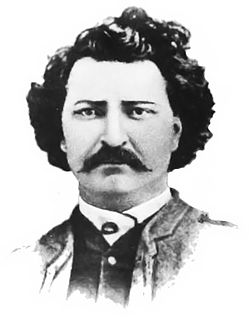
Louis Riel was a Canadian politician, a founder of the province of Manitoba, and a political leader of the Métis people. He led two resistance movements against the Government of Canada and its first prime minister John A. Macdonald. Riel sought to defend Métis rights and identity as the Northwest Territories came progressively under the Canadian sphere of influence.
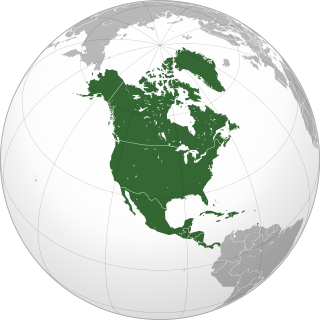
North America is a continent in the Northern Hemisphere and almost entirely within the Western Hemisphere. It is bordered to the north by the Arctic Ocean, to the east by the Atlantic Ocean, to the southeast by South America and the Caribbean Sea, and to the west and south by the Pacific Ocean. Because it is on the North American Tectonic Plate, Greenland is included as a part of North America geographically.
The Christian right, or the religious right, are Christian political factions characterized by their strong support of socially conservative and traditionalist policies. Christian conservatives seek to influence politics and public policy with their interpretation of the teachings of Christianity.
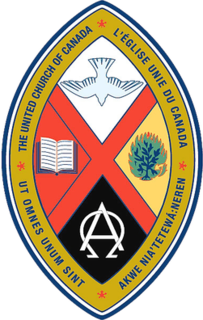
The United Church of Canada is a mainline Protestant denomination that is the largest Protestant Christian denomination in Canada and the second largest Canadian Christian denomination after the Catholic Church in Canada.

Stanley Mikita was a Slovak-born Canadian ice hockey player for the Chicago Black Hawks of the National Hockey League, generally regarded as the best centre of the 1960s. In 2017, he was named one of the 100 Greatest NHL Players. In 1961, he became the first Slovak-born player to win the Stanley Cup.

Events from the year 1891 in Canada.

The Canadian Catholic Church, or Catholic Church in Canada, is part of the worldwide Catholic Church, and has a decentralised structure, meaning each diocesan bishop is autonomous but under the spiritual leadership of the Pope and the Canadian Conference of Catholic Bishops. As of 2011, it has the largest number of adherents to a Christian denomination and a religion in Canada, with 38.7% of Canadians being adherents according to the census in 2011. There are 73 dioceses and about 7,000 priests in Canada. On a normal Sunday, between 15 and 25 percent of Canada's Catholics attend Mass.

Religion in the Philippines is marked by a majority of people being adherents of the Christian faith. At least 88% of the population is Christian; about 79% belong to the Catholic Church while about 9% belong to Protestantism, Orthodoxy, Restorationist and Independent Catholicism and other denominations such as Iglesia Filipina Independiente, Iglesia ni Cristo, Seventh-day Adventist Church, United Church of Christ in the Philippines, Members Church of God International (MCGI) and Pentecostals. Officially, the Philippines is a secular nation, with the Constitution guaranteeing separation of church and state, and requiring the government to respect all religious beliefs equally.
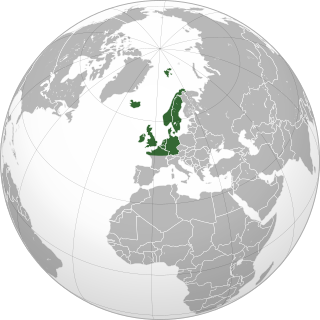
Northwestern Europe, or Northwest Europe, is a loosely defined subregion of Europe, overlapping Northern and Western Europe. The region can be defined both geographically and ethnographically.
Religion in Canada encompasses a wide range of groups and beliefs. Christianity is the largest religion in Canada, with Roman Catholics having the most adherents. Christians, representing 67.2% of the population in 2011, are followed by people having no religion with 23.9% of the total population. Other faiths include Islam (3.2%), Hindus (1.5%), Sikhs (1.4%), Buddhists (1.1%), and Jews (1.0%). Rates of religious adherence are steadily decreasing. The preamble to the Canadian Charter of Rights and Freedoms refers to God. The monarch carries the title of "Defender of the Faith". However, Canada has no official religion, and support for religious pluralism and freedom of religion is an important part of Canada's political culture.

The mainline Protestant churches are a group of Protestant denominations in the United States that contrast in history and practice with evangelical, fundamentalist, and charismatic Protestant denominations. Some make a distinction between "mainline" and "oldline", with the former referring only to denominational ties and the latter referring to church lineage, prestige and influence. However, this distinction has largely been lost to history and the terms are now nearly synonymous.

A Christian mission is an organized effort to spread Christianity to new converts. Missions involve sending individuals and groups across boundaries, most commonly geographical boundaries, to carry on evangelism or other activities, such as educational or hospital work. Sometimes individuals are sent and are called missionaries. When groups are sent, they are often called mission teams and they do mission trips. There are a few different kinds of mission trips: short-term, long-term, relational and those that simply help people in need. Some people choose to dedicate their whole lives to mission. Missionaries preach the Christian faith, and provide humanitarian aid. Christian doctrines permit the provision of aid without requiring religious conversion. However, Christian missionaries are implicated in the genocide of indigenous peoples. Around 100,000 native people in California, U.S., or 1/3 of the native population, are said to have died due to missions.
The Neo-charismaticmovement is a movement within evangelical Protestant Christianity that is composed of a diverse range of independent churches and organizations that emphasize the post-biblical availability of gifts of the Holy Spirit, such as speaking in tongues and faith healing. The Neo-charismatic movement is considered to be the "third wave" of the Charismatic Christian tradition which began with Pentecostalism, and was furthered by the Charismatic movement. As a result of the growth of postdenominational and independent charismatic groups, Neo-charismatics are now believed to be more numerous than the first and second wave categories. As of 2002, some 19,000 denominations or groups, with approximately 295 million individual adherents, were identified as Neo-charismatic.

Canadians are people identified with the country of Canada. This connection may be residential, legal, historical or cultural. For most Canadians, many of these connections exist and are collectively the source of their being Canadian.

Protestantism is a form of Christianity that originated with the 16th-century Reformation, a movement against what its followers perceived to be errors in the Catholic Church. Protestants originating in the Reformation reject the Catholic doctrine of papal supremacy, but disagree among themselves regarding the number of sacraments, the real presence of Christ in the Eucharist, and matters of ecclesiastical polity and apostolic succession. They emphasize the priesthood of all believers; justification by faith alone rather than by faith with good works; the teaching that salvation comes by divine grace or "unmerited favor" only, not as something merited ; and either affirm the Bible as being the sole highest authority or primary authority for Christian doctrine, rather than being on parity with sacred tradition. The five solae of Lutheran and Reformed Christianity summarise basic theological differences in opposition to the Catholic Church.
The history of the First Nations is the prehistory and history of present-day Canada's peoples from the earliest times to the present day with a focus on the First Nations. The pre-history settlement of the Americas is a subject of ongoing debate because First Nations oral history, combined with new methodologies and technologies which are used by archaeologists, linguists, and other researchers, produce—new and sometimes conflicting—evidence. The 1996 Report by the Royal Commission on Aboriginal People described four stages in Canadian history that overlap and occur at different times in different regions: 1) Pre-contact – Different Worlds – Contact; 2) Early Colonies (1500–1763); 3) Displacement and Assimilation (1764–1969); and 4) Renewal to Constitutional Entrenchment (2018).

The Big Short is a 2015 American biographical comedy-drama film directed by Adam McKay. Written by McKay and Charles Randolph, it is based on the 2010 book The Big Short: Inside the Doomsday Machine by Michael Lewis showing how the financial crisis of 2007–2008 was triggered by the United States housing bubble. The film stars Christian Bale, Steve Carell, Ryan Gosling and Brad Pitt, with Melissa Leo, Hamish Linklater, John Magaro, Rafe Spall, Jeremy Strong, Finn Wittrock, and Marisa Tomei in supporting roles.
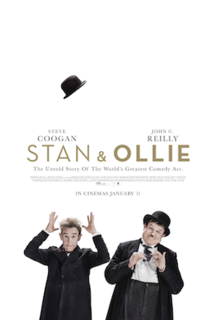
Stan & Ollie is a 2018 biographical comedy-drama film directed by Jon S. Baird and written by Jeff Pope. Based on the later years of the lives of the comedy double act Laurel and Hardy, the film stars Steve Coogan and John C. Reilly as Stan Laurel and Oliver Hardy. The film focuses on details of the comedy duo's personal relationship while relating how they embarked on a gruelling music hall tour of the United Kingdom and Ireland during 1953 and struggled to get another film made.
References
- McKay, Stan (1996). "An Aboriginal Christian Perspective on the Integrity of Creation". In Treat, James (ed.). Native and Christian: Indigenous Voices on Religious Identity in the United States and Canada. New York: Routledge. p. 51. ISBN 0-415-91373-X.
- "Stanley John McKay". Indspire. Archived from the original on April 21, 2015. Retrieved April 21, 2015.
- "This week in religion history: Blasphemy on the silver screen?". National Post. Toronto: Postmedia Network. The Canadian Press. August 12, 2012. Retrieved April 21, 2015.